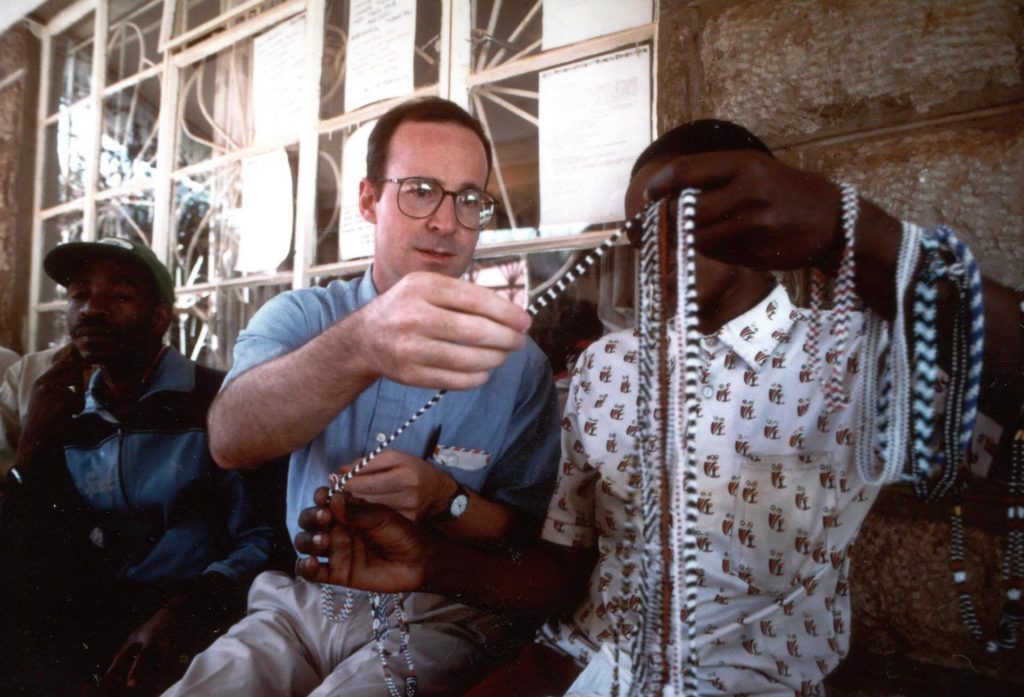March 26, 2022 Essay: Walking with the Excluded

From 1992 to 1994, my ministry in Kenya was with the Jesuit Refugee Service, helping refugees from all over East Africa who had settled in the slums of Nairobi start small businesses. I learned a great deal from the refugees about persistence, hope, faith, hard work, and humor.
But perhaps the most vivid experience came on one of my first days, and in a sense, it was a sort of reification or maybe even culmination of the lesson that you should never assume that you know someone’s life, and certainly never just dump them into a category or stereotype.
At the beginning of my time there, I worked at a UN intake center in Nairobi, staffed by JRS, which admittedly was a strange arrangement. And I was asked to interview refugees, to help “process” them.
The first person I saw was a Somali man. He looked like many East African refugees: tired, disheveled, dressed in old clothes. And I think even then I thought: “Oh a refugee,” not “Oh, he’s a human being with a background.” I thought well, he’s probably used to this kind of life: on the go, a nomad, maybe some sort of cattle farmer, so he’s probably not unused to migrating and living from the land, and so on.
So I said, in my poor Swahili, “What language would you like to speak in?”
And he said in perfect English. “Well, English is fine.” Then he paused. “So is Swahili, Italian, French, and Latin.” He was a philosophy professor at the University of Mogadishu.
For me, that just summed up so much that I had learned since I entered the novitiate. We don’t know people’s lives. We need to treat them with dignity. And we cannot see them just as categories.
All this means listening. And this is what I’ve tried to do in my ministry with LGBTQ people lately, especially LGBTQ Catholics. All these ministries that I did as a Jesuit in formation have helped me to understand my ministry with LGBTQ Catholics. Yes, their lives are different from East African refugees, from street-gang members, from homeless people, from the sick and dying in Jamaica, and people with serious illnesses, though there are LGBTQ people among all those groups. But the lessons of my formation: treat them not as categories but as individuals, don’t assume you know what they need, don’t assume that you know their lives, treat them like kings and queens, no pun intended by the way, and, most of all, of loving them as they are not as how we would want them to be, are all operative.
But this is not just about “Walking with the Excluded” as a “Universal Apostolic Preference,” this is about something deeper: following Jesus Christ.
We see these patterns that time and time again in Jesus’s own public ministry. Whenever he meets someone who is “excluded,” whether it is a Roman centurion, a person suffering from leprosy, a Samaritan woman looking for water, a hated tax collector, a demon-possessed man, or anyone who has been ignored, rejected, or excluded, we see him listening to them, encountering them, and treating them as individuals, not as categories or stereotypes, with their own hopes and dreams.
So what are we called to do? In the words of the Society of Jesus, to “walk with the poor, the outcasts of the world, those whose dignity has been violated, in a mission of reconciliation and justice.” In Jesus’s words, “love them.” Soon we realize that those on the “margins” or the “peripheries” are really where we should be, and that becomes our new center, where we find community. Walking with the excluded in the end eventually becomes building a community of love, and helping to usher in the reign of God.
– Fr. James Martin, S.J.
Excerpted from Fr. Martin’s talk “Walking with the Excluded,” to be presented on Monday, March 28th at 7 PM. To register, click here.
